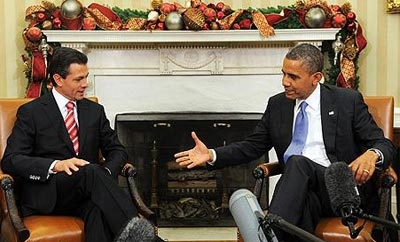The White House’s newly released 2013 National Southwest Border Counternarcotics Strategy continues the Obama administration’s shift towards training, institution building, and civil society investment, and calls for deepening cooperation between the two countries, despite recent tensions.
The report [pdf] describes nine strategic objectives, which focus on improving interdiction of drugs, arms and cash, and efforts to tackle money laundering, dismantling drug trafficking organizations operating in the border region, developing “strong and resilient” communities, and enhancing bilateral counternarcotics cooperation.
The plan reiterates the US’s refocusing of its Merida initiative priorities away from providing security equipment and towards building stronger judicial institutions, training and technical assistance for law enforcement, and increased support for civil society organizations working in the rule of law and human rights. It also sees the broadening of the initiative to include assistance to local state level authorities instead of just working on the Federal level.
In fitting with the Obama government’s aim of moving to a more humanistic counternarcotics policy, there are also plans to strengthen communities in the border region, with resources to be dedicated to tackling substance abuse and violence through health and education programs.
The report also contains a particular focus on increased intelligence sharing between the United States and Mexico, with the El Paso Intelligence Center (EPIC) slated to become a “key node” for intelligence.
InSight Crime Analysis
The White House strategy report contains few surprises, and is clearly based on Obama’s drift away from policies focused almost entirely on security to include broader social issues that fuel organized crime and the drug trade.
One striking aspect is the continued commitment to close cooperation with Mexico. This section of the report displays no hint of the rhetorical bluster that has surrounded bilateral debate over new Mexican President Enrique Peña Nieto’s security policies.
The election of Peña Nieto sparked vocal concerns among US political leaders over his stated desire to move priorities away from arrests and drug seizures, and towards violence reduction, and there have also been reports of tensions between the incoming government and US officials over the level of US involvement in Mexican security policies.
However, the US strategy displays no sign of this friction, only expressing a desire to increase cooperation, which despite the public murmurings is likely to be the case.

